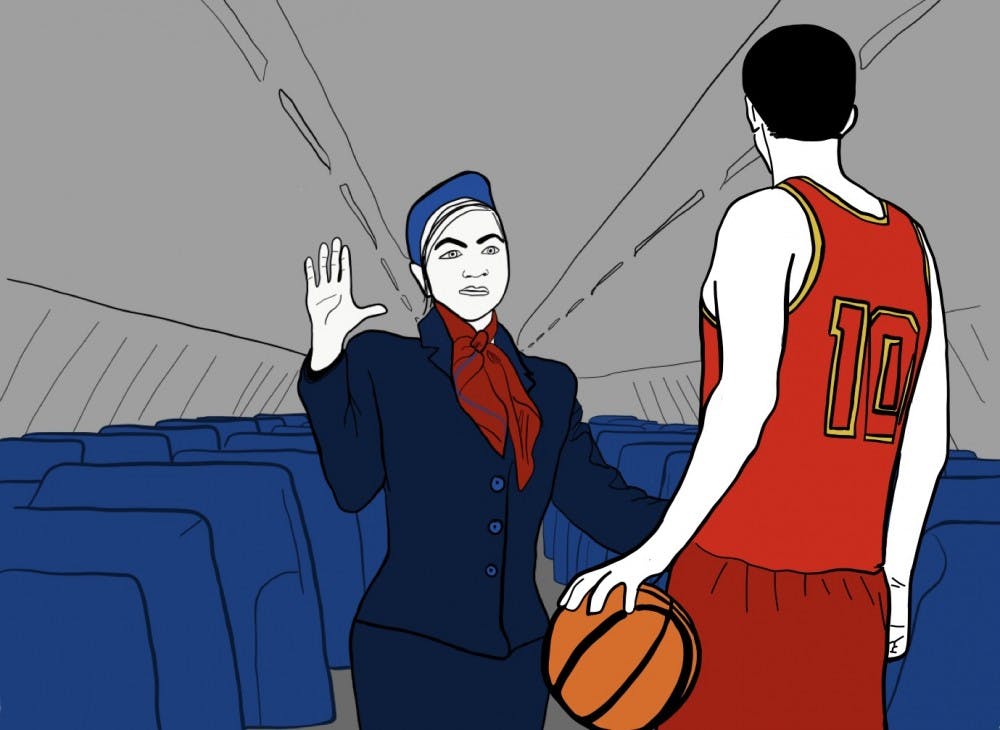One of President Trump’s first executive actions was to place a ban on citizens of seven predominantly Muslim countries from entering the United States. Trump argues that he was keeping our country safe, but there were a number of unforeseen consequences of this ban, including negative effects on international athletes.
Seeing as ASU is the number one public university chosen by international students, the ban could hinder the international athletes wanting to play for ASU. This ban was only active for a short time before three judges from the U.S. Court of Appeals for the 9th Circuit refused to stay a lower court's temporary restraining order, effectively freezing Trump's travel ban.
“While Donald Trump might be critical of (the court’s decision) and not agree with it, it was the right decision given the arguments that were made in the case,” sports law attorney Daniel Wallach said. “It was an executive order that was rushed out without giving thoughts to issues such as dual citizenship, athlete visas, work visas, permanent resident aliens and green cards. It was a very thoughtless rollout of a travel ban.”
Although the travel ban is frozen at the moment, it was around for enough time to affect athletes around the world. President Trump could decide to appeal the court's decision to the Supreme Court, or he could instill a new travel ban with some tweaks through another executive order.
Athletes from different countries worldwide now playing in the United States did not know how this law would affect them when it was first passed. According to an NBA statement published in Deadspin, the Milwaukee Bucks were “concerned about (Thon) Maker’s ability to travel freely with the team back to the United States form its game Friday in Toronto.”
Maker made it back to the United States, but even a Bucks team official tweeted that we need to “pray for those who aren’t as lucky.”
@Dakota_Schmidt He's back. But we have to pray for those who aren't as lucky. This is a massive problem and not who we are as a country.
— Alex Lasry (@AlexanderLasry) January 28, 2017
But what if Maker wasn’t as lucky?
He almost came to Arizona State this season to play under Bobby Hurley before he decided to go into the 2016 NBA draft where he was picked as the 10th pick. Would Maker have made it back if he was only a collegiate athlete?
According to Wallach, there’s no way to know if he would have made it back if he weren’t in the NBA since the law had many, but it appears the Trump administration doesn’t want to leave world-class athletes stranded.
This law could have a terrible effect on how teams recruit foreign players. There is no doubt that players like Thon Maker are fantastic, but teams may not be willing to recruit some athletes due to the potentially negative consequences on team travel.
“(A similar ban) could have a chilling effect on recruitment and development of these (international) players,” Wallach said.
The travel ban didn’t only affect international players in the United States or playing in the country — there are people making a living overseas who are also feeling the consequences of this executive order.
“This doesn’t just affect dual-citizenship athletes and foreign athletes coming here to play, but it also impacts our US-born athletes who are playing in international competitions in countries like Iran,” he said. “It is impacting athletes probably more overseas than in this country because of the reciprocal bans that have been imposed.”
Not only is this impacting athletes playing in the country and U.S.-born athletes playing overseas, but it will also hinder our chances of landing two of the biggest global competitions.
“The United States is going to pay a price for its restrictive immigration policy,” Wallach said. “Any hope that the U.S. has of getting a U.S. Olympic bid or being selected as the site for the World Cup is now in jeopardy.”
With the United States trying to land bids for the 2024 Olympics and future World Cups, its policies are deeply threatening any chances of winning the opportunity to host the games.
“You think there’s any chance the U.S. gets the Olympic bid for 2024?” Wallach said. “I mean that’s basically thrown right out the window.”
The Trump administration needs to think of the consequences before recklessly passing executive orders that will hurt our nation’s chances for events like these and cause other countries to look down upon us.
“The greater damage that will be done by the executive order is our standing throughout the world and how we’re perceived as respecting human rights and civil rights,” Wallach said. “It will cost us when games are selected for the Olympics and the World Cup. We’re going to pay a price for our short-sightedness on this issue."
Reach the columnist at kmarlin1@asu.edu or follow @kynan_marlin on Twitter.
Editor’s note: The opinions presented in this column are the author’s and do not imply any endorsement from The State Press or its editors.
Want to join the conversation? Send an email to opiniondesk.statepress@gmail.com. Keep letters under 300 words and be sure to include your university affiliation. Anonymity will not be granted.
Like The State Press on Facebook and follow @statepress on Twitter.




